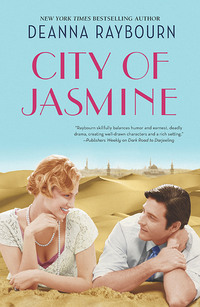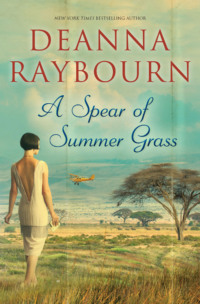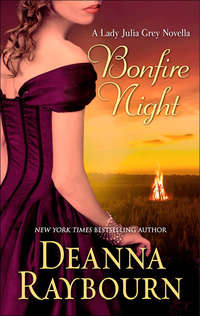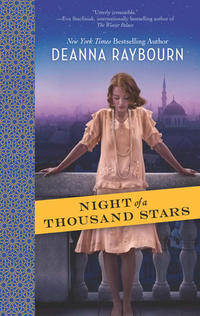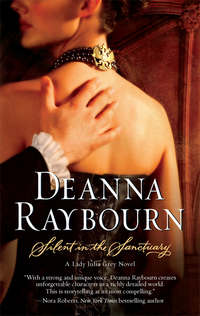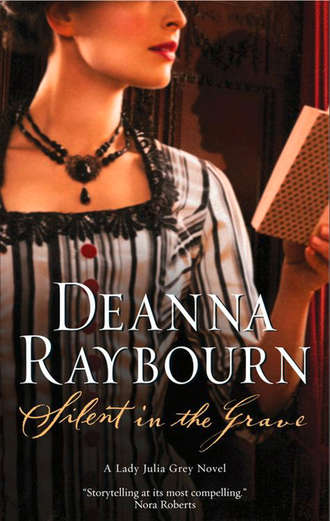
Полная версия
Silent In The Grave

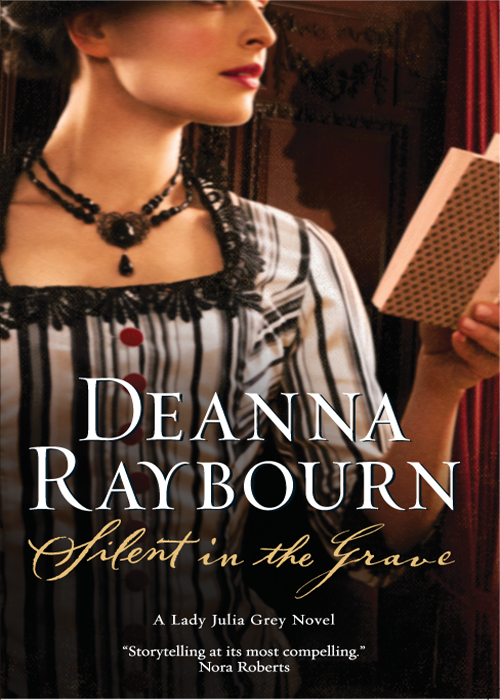
Praise for DEANNA RAYBOURN
“With a strong and unique voice, Deanna Raybourn creates unforgettable characters in a richly detailed world. This is storytelling at its most compelling.”
—Nora Roberts, New York Times bestselling author
“[A] perfectly executed debut.”
—Publishers Weekly, starred review
“This debut novel has one of the most clever endings I’ve seen.”
—Karen Harper, New York Times bestselling author
“A riveting drama that makes page turning obligatory. A very fine debut effort from Deanna Raybourn”
—Bookreporter.com
“I found it delightfully absorbing.”
—The Bookseller
About the Author
With degrees in English and History and a particular love of Regency and Victorian times, DEANNA RAYBOURN is a committed anglophile, who, at her husband’s insistence, gave up teaching to devote her energies to writing. Clearly her husband knew what he was doing.
Silent in the Grave is Deanna’s debut novel and is the first in the SILENT series featuring the effervescent Lady Julia Grey and the enigmatic private investigator Nicholas Brisbane.
Deanna is currently hard at work on the next instalment in the award-winning Lady Julia Grey series from her current home in Virginia.
Find out more online at www.mirabooks.co.uk/deanna raybourn
Silent in the Grave
DEANNA RAYBOURN

This book is dedicated to the memory of my grandmother, Patricia Nile Russell, and my grandfather, John Lucius Jones, Jr.
THE FIRST CHAPTER

London, 1886
Other sins only speak; murder shrieks out.
—John Webster
The Duchess of Malfi
To say that I met Nicholas Brisbane over my husband’s dead body is not entirely accurate. Edward, it should be noted, was still twitching upon the floor.
I stared at him, not quite taking in the fact that he had just collapsed at my feet. He lay, curled like a question mark, his evening suit ink-black against the white marble of the floor. He was writhing, his fingers knotted.
I leaned as close to him as my corset would permit.
“Edward, we have guests. Do get up. If this is some sort of silly prank—”
“He is not jesting, my lady. He is convulsing.”
An impatient figure in black pushed past me to kneel at Edward’s side. He busied himself for a few brisk moments, palpating and pulse-taking, while I bobbed a bit, trying to see over his shoulder. Behind me the guests were murmuring, buzzing, pushing closer to get a look of their own. There was a little thrill of excitement in the air. After all, it was not every evening that a baronet collapsed senseless in his own music room. And Edward was proving rather better entertainment than the soprano we had engaged.
Through the press, Aquinas, our butler, managed to squeeze in next to my elbow.
“My lady?”
I looked at him, grateful to have an excuse to turn away from the spectacle on the floor.
“Aquinas, Sir Edward has had an attack.”
“And would be better served in his own bed,” said the gentleman from the floor. He rose, lifting Edward into his arms with a good deal of care and very little effort, it seemed. But Edward had grown thin in the past months. I doubted he weighed much more than I.
“Follow me,” I instructed, although Aquinas actually led the way out of the music room. People moved slowly out of our path, as though they regretted the little drama ending so quickly. There were some polite murmurs, some mournful clucking. I heard snatches as I passed through them.
“The curse of the Greys, it is—”
“So young. But of course his father never saw thirty-five.”
“Never make old bones—”
“Feeble heart. Pity, he was always such a pleasant fellow.”
I moved faster, staring straight ahead so that I did not have to meet their eyes. I kept my gaze fixed on Aquinas’ broad, black-wool back, but all the time I was conscious of those voices and the sound of footsteps behind me, the footsteps of the gentleman who was carrying my husband. Edward groaned softly as we reached the stairs and I turned. The gentleman’s face was grim.
“Aquinas, help the gentleman—”
“I have him,” he interrupted, brushing past me. Aquinas obediently led him to Edward’s bedchamber. Together they settled Edward onto the bed, and the gentleman began to loosen his clothes. He flicked a glance toward Aquinas.
“Has he a doctor?”
“Yes, sir. Doctor Griggs, Golden Square.”
“Send for him. Although I dare say it will be too late.”
Aquinas turned to me where I stood, hovering on the threshold. I never went into Edward’s room. I did not like to do so now. It felt like an intrusion, a trespass on his privacy.
“Shall I send for Lord March as well, my lady?”
I blinked at Aquinas. “Why should Father come? He is no doctor.”
But Aquinas was quicker than I. I had thought the gentleman meant that Edward would have recovered from his attack by the time Doctor Griggs arrived. Aquinas, who had seen more of the world than I, knew better.
He looked at me, his eyes carefully correct, and then I understood why he wanted to send for Father. As head of the family he would have certain responsibilities.
I nodded slowly. “Yes, send for him.” I moved into the room on reluctant legs. I knew I should be there, doing whatever little bit that I could for Edward. But I stopped at the side of the bed. I did not touch him.
“And Lord Bellmont?” Aquinas queried.
I thought for a moment. “No, it is Friday. Parliament is sitting late.”
That much was a mercy. Father I could cope with. But not my eldest brother as well. “And I suppose you ought to call for the carriages. Send everyone home. Make my apologies.”
He left us alone then, the stranger and I. We stood on opposite sides of the bed, Edward convulsing between us. He stopped after a moment and the gentleman placed a finger at his throat.
“His pulse is very weak,” he said finally. “You should prepare yourself.”
I did not look at him. I kept my eyes fixed on Edward’s pale face. It shone with sweat, its surface etched with lines of pain. This was not how I wanted to remember him.
“I have known him for more than twenty years,” I said finally, my voice tight and strange. “We were children together. We used to play pirates and knights of the Round Table. Even then, I knew his heart was not sound. He used to go quite blue sometimes when he was overtired. This is not unexpected.”
I looked up then to find the stranger’s eyes on me. They were the darkest eyes I had ever seen, witch-black and watchful. His gaze was not friendly. He was regarding me coldly, as a merchant will appraise a piece of goods to determine its worth. I dropped my eyes at once.
“Thank you for your concern for my husband’s health, sir. You have been most helpful. Are you a friend of Edward’s?”
He did not reply at once. Edward made a noise in the back of his throat and the stranger moved swiftly, rolling him onto his side and thrusting a basin beneath his mouth. Edward retched, horribly, groaning. When he finished, the gentleman put the basin to the side and wiped his mouth with his handkerchief. Edward gave a little whimper and began to shiver. The gentleman watched him closely.
“Not a friend, no. A business associate,” he said finally. “My name is Nicholas Brisbane.”
“I am—”
“I know who you are, my lady.”
Startled at his rudeness, I looked up, only to find those eyes again, fixed on me with naked hostility. I opened my mouth to reproach him, but Aquinas appeared then. I turned to him, relieved.
“Aquinas?”
“The carriages are being brought round now, my lady. I have sent Henry for Doctor Griggs and Desmond for his lordship. Lady Otterbourne and Mr. Phillips both asked me to convey their concern and their willingness to help should you have need of them.”
“Lady Otterbourne is a meddlesome old gossip and Mr. Phillips would be no use whatsoever. Send them home.”
I was conscious of Mr. Brisbane behind me, listening to every word. I did not care. For some unaccountable reason, the man thought ill of me already. I did not mind if he thought worse.
Aquinas left again, but I did not resume my post by the bed. I took a chair next to the door and remained there, saying nothing and wondering what was going to happen to all of the food. We had ordered far too much in any event. Edward never liked to run short. I could always tell Cook to serve it in the servants’ hall, but after a few days even the staff would tire of it. Before I could decide what to do with the lobster patties and salad molds, Aquinas entered again, leading Doctor Griggs. The elderly man was perspiring freely, patting his ruddy face with a handkerchief and gasping. He had taken the stairs too quickly. I rose and he took my hand.
“I was afraid of this,” he murmured. “The curse of the Greys, it is. All snatched before their time. My poor girl.” I smiled feebly at him. Doctor Griggs had attended my mother at my birth, as well as her nine other confinements. We had known each other too long to stand on ceremony. He patted my hand and moved to the bed. He felt for Edward’s pulse, shaking his head as he did so. Edward vomited again, and Doctor Griggs watched him carefully, examining the contents of the basin. I turned away.
I tried not to hear the sounds coming from the bed, the groans and the rattling breaths. I would have stopped my ears with my hands, but I knew it would look childish and cowardly. Griggs continued his examination, but before he finished Aquinas stepped into the room.
“Lord March, my lady.” He moved aside and Father entered.
“Julia,” he said, opening his arms. I went into them, burying my face against his waistcoat. He smelled of tobacco and book leather. He kept one arm tucked firmly around me as he looked over my head.
“Griggs, you damned fool. Julia should have been sent away.”
The doctor made some reply, but I did not hear it. My father was pushing me gently out the door. I tried to look past him, to see what they were doing to Edward, but Father moved his body and prevented me. He gave me a sad, gentle smile. Anyone else might have mistaken that smile, but I did not. I knew he expected obedience. I nodded.
“I shall wait in my room.”
“That would be best. I will come when there is something to tell.”
My maid, Morag, was waiting for me. She helped me out of my silk gown and into something more suitable. She offered me warm milk or brandy, but I knew I would never be able to hold anything down. I only wanted to sit, watching the clock on the mantel as it ticked away the minutes left.
Morag continued to fuss, poking at the fire and muttering complaints about the work to come. She was right about that. There would be much work for her when I put on widow’s weeds. It was unlucky to keep crepe in the house, I reminded myself. It would have to be sent for after Edward passed. I thought about such things—crepe for the mirrors, black plumes for the horses—because then I did not have to think about what was happening in Edward’s room. It was rather like waiting for a birth, these long, tense minutes of sitting, straining one’s ears on tiptoe for the slightest sound. I expected to hear something, but the walls were thick and I heard nothing. Even when the clock struck midnight, the little voice on my mantel chiming twelve times, I could not hear the tall case clock in the hall. I started to mention the peculiarity of it to Morag, because one could always hear the case clock from any room in the house, when I realized what it meant.
“Morag, the clocks have stopped.”
She looked at me, her lips parted to speak, but she said nothing. Instead she bowed her head and began to pray. A moment later, the door opened. It was Father. He said nothing. I went to him and his hand cradled my head like a benediction. He held me for a very long time, as he had not done since I was a child.
“It is all right, my dear,” he said finally, sounding older and more tired than I had ever heard him. “It is over.”
But of course, he was entirely wrong. It was only the beginning.
THE SECOND CHAPTER

He heaps up riches, and he heaps up sorrow, It’s his today, but who’s his heir tomorrow?
—Anne Bradstreet
“The Vanity of All Worldly Things”
The days leading up to the funeral were dire, as such days almost always are. Too many people, saying too many pointless things—the same pointless things that everyone always says. Such a tragedy, so unexpected, so very, very dreadful. And no matter how much you would like to scream at them to go away and leave you alone, you cannot, even if they are your family.
Especially if they are your family. In the week following Edward’s death, I was inundated with March relations. They flocked from the four corners of the kingdom, as mindful of the pleasures of London as their family duty. As etiquette did not permit me to be seen in public, they came to me at Grey House. The men—uncles, brothers, cousins—briefly paid their respects to Edward, laid out with awful irony in the music room, then spent the rest of their time arguing politics and arranging for amusements that would get them out of the house. My only consolation was the fact that, like locusts, they managed to finish off all of the leftover food from the night Edward died.
The women were little better. Under Aunt Hermia’s direction, the funeral was planned, the burial arranged, and my household turned entirely on its head. She carried around with her a notebook filled with endless lists that she was forever consulting with a frown or ticking off with a satisfied smile. There was the crepe to be ordered, mourning wreaths, funeral cards, black-bordered writing paper to be purchased, the announcement for the Times, and of course my wardrobe.
“Unrelieved black,” she informed me, her brow furrowed as she struggled to make out her own handwriting. “There must be no sheen to the fabric and no white or grey,” she reminded me.
“I know.” I tried not to think of the new gowns, delivered only the day before Edward’s death. They were pale, soft colours, the shades of new flowers in spring. I should have to give them to Morag to sell at the secondhand stalls now. They would never dye dark enough to pass for mourning.
“No jewels, except hair jewelry,” Aunt Hermia was saying. I repressed a shudder. I had never warmed to the notion of wearing a dead person’s hair braided around my wrist or knotted at my ears. “After a year and a day, you will be permitted black fabric with a sheen, and deep purple or grey with a black stripe. If you choose to wear black after that time, you may relieve it with touches of white. Although,” she added with a conspiratorial look, “I think a year is quite enough, and you must do what you like after that.”
I glanced at my sister Portia, who was busy feeding her ancient pug some rather costly crab fritters laced with caviar. She looked up and wrinkled her nose at me over Puggy’s head.
“Don’t fret, dearest. You have always looked striking in black.”
I grimaced at her and turned back to Aunt Hermia, who was deliberately ignoring Portia’s flippancy. As children, we had been quite certain that Aunt Hermia was partially deaf. It was only much later when we realized that there was absolutely nothing wrong with her hearing. The trick of hearing only what she wanted had enabled her to raise her widowed brother’s ten children with some measure of sanity.
“Black stockings of course,” she was saying, “and we shall have to order some new handkerchiefs edged in black.”
“I am working on them now,” said my sister Bee from the corner. Industrious as her namesake, she kept her head bowed over her work, her needle whipping through the fine lawn with its load of thin black silk.
“Very good, Beatrice. That will save time having them made up, and I simply could not bear to purchase ready-made for Julia.” Aunt Hermia paused, her pencil poised. “You know, the queen has hers embroidered with black tears for Prince Albert. What do you think of that?”
Bee lifted her head and smiled. “I think perhaps plain is best. I mean to get through all of her handkerchiefs before I have to return to Cornwall, and I shall be lucky just to finish the borders.”
“Of course, dear,” Aunt Hermia said. She returned to her list, but I kept my eyes on Bee. She had not looked at me, and I fancied that her preoccupation with my handkerchiefs was a means of keeping herself too busy to do so. I wondered then how much she knew, how much any of them knew. Marriage is a private thing between a man and his wife, but blood calls to blood, or so my father always said. Was it possible for them to know? I had said nothing, and yet still, I wondered ….
“And we should tell Aquinas to prepare the China Room for Aunt Ursula.”
I swung round to face Aunt Hermia. The room had gone quite productively silent. Bee was busy with her needlework, Portia and Nerissa were writing out the funeral cards. Olivia immediately picked up a book of hymns to peruse.
“Aunt Ursula? The Ghoul is coming?”
“Really, darling, I wish you children would not call her that,” Aunt Hermia said, frowning. “She is a good and decent soul. She only wishes to offer comfort in your bereavement.”
Portia smothered a snort. We all knew better than that. The Ghoul’s purpose in life was not to give comfort, it was to haunt the bereaved. She appeared at every deathbed, every funeral, with her trunks of mourning clothes and memorial jewelry, reading dreary poems and tippling the sherry when no one was looking. She kept a sort of scrapbook of the funerals she had attended, rating them by number of mourners, desirability of the gravesite and quality of the food. The worst part of it was that she never left. Instead, she stayed on, offering her own wretched brand of comfort until the next family tragedy. We had been quite fortunate in London, though. A spate of ill luck had carried off three of our elderly uncles in Scotland in as many years. We had not seen her for ages.
“Julia?” Aunt Hermia’s voice was edged only slightly with impatience, and I realized she must have been trying to get my attention for some time.
“I am sorry, Aunt. I was woolgathering.”
She patted my hand. “Never mind, dear. I hear Uncle Leonato’s wife is suffering again from her old lung complaint. Perhaps she won’t last much longer.”
That was a small consolation. Uncle Leonato’s wife usually hovered on the brink of death until he presented her with whatever piece of jewelry or lavish trinket she had been pining for, then she made a full recovery quickly enough. Still, there was a pack of hunting-mad cousins in Yorkshire who were always highly unlucky. Perhaps this season one of them might be mistaken for a stag ….
Aunt Hermia coughed gently and I looked up. “Olivia was asking about the gravesite. She said there is a very nice spot just beyond the Circle of Lebanon.”
The Circle of Lebanon in Highgate Cemetery, perhaps the most fashionable address for the dead in all of London. That would have appealed to Edward.
“That sounds fine. Whatever you think best.”
She ticked off another item in her notebook. “Now, what about music?”
What followed was a spirited debate in which I took no part. I tried to appear too grief-stricken to decide, but the truth was, I could not bring myself to care. Edward was gone, there seemed little point in arguing over what the choirboys sang. In the end, my eldest sister, Olivia, prevailed by sheer strength of personality. It did not matter. I never heard the boys sing at all. In the same fashion, I saw the lilies, but I did not smell them. I knew it was cold the day of Edward’s funeral because they bundled me into a black astrakhan coat, but I felt nothing. I was entirely numb, as though every nerve, every sense, every cell had simply stopped functioning.
Perhaps it was best that way. I had begun to get snappish and fretful. I had slept poorly since Edward’s death, and having no peace, no privacy in my own home was beginning to tell. All I wanted was to bury Edward and send my family home. I loved them, but from a distance. Their quirks and eccentricities, for which we Marches were justly famous, were magnified within the walls of Grey House.
Mercifully, most of them stayed with Father, but a few elected to comfort me in my grief and had moved in, lock, stock and barrel. The least offensive of these was my brother Valerius. A quiet, somewhat sulky youth, he was six years my junior, and I think he found my company marginally less repressive than Father’s. Edward’s first cousin and heir also gave me little trouble. Simon was sickly and bedridden, afflicted with the same heart complaint that had taken all of his kinsmen. Like Edward he would not make old bones, but it was my lot to care for him until he passed.
The last of my new houseguests was the Ghoul, who had arrived with the expected trunks and a lady’s maid half as old as God. Aquinas had installed them in the China Room, which elicited a flurry of complaints. The room was too cold, the exposure too bright—the litany went on and on. I waved my hand, leaving Aquinas to manage, which he did with his customary efficiency. A small heater was installed, the heavy draperies were drawn, and a fresh bottle of gin was placed on the dressing table, sherry having apparently been given up in favor of something more potent. Since then, I had heard nothing from her whatsoever, and I made a note to instruct Aquinas to add a weekly bottle to the household expenses.
But as much as I complained about them, I was glad to have my family around me as I moved through that awful day. I felt like a sleepwalker, being shifted and guided and turned this way and that, but feeling nothing. They told me later that the sermon was lovely. I was glad of that. I had not listened, and I much suspected that the vicar could not possibly have anything comforting to say. He probably quoted Job, that absurd passage about flowers being cut down. They always quote that. And he probably made some innocuous observations about Edward, observations from a man who had not known him. Edward had not been a great believer, nor was I for that matter. We had been brought up to attend when absolutely necessary, and to observe the conventions, but my family was populated with free-thinking Radicals and Edward’s was simply lazy.
The end result was, I was certain, a eulogy that could have been spoken over the body of any rich, youngish dead man. I did not like to think of that. I did not like to know that Edward, the boy I had loved and married, was already being lost. He was anonymous to the vicar, to the grave digger, to anyone who passed his grave. No one would remember his charm, his beautiful gilt hair, his sweetly serious smile, his ability to tell jokes, his utter incompetence with wine. I would be the only one to remember him as he truly was, and I did not want to remember him at all.
I tried to imagine, as I stood over his open grave, what I would have carved onto the stone. Nothing seemed appropriate. I ran Bible verses and bits of poetry through my mind as the vicar droned on about ashes and death, but nothing fit. I had a few months yet before they would put the stone in place. They would wait until the ground settled before they brought it. I knew that I had to think of something, some brief commentary on his life, some scrap of wit to sum him up, but that was impossible. Words are simple, Edward had not been.


